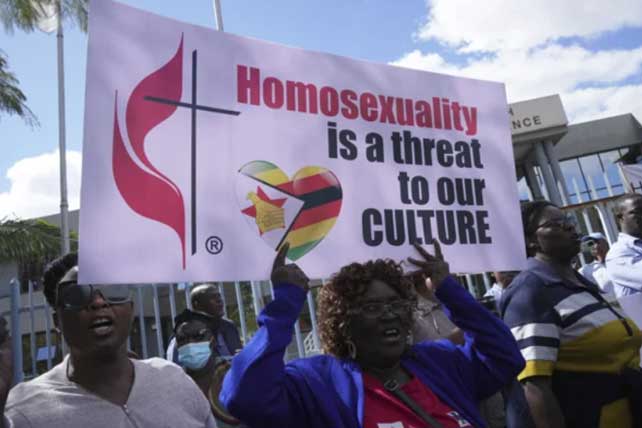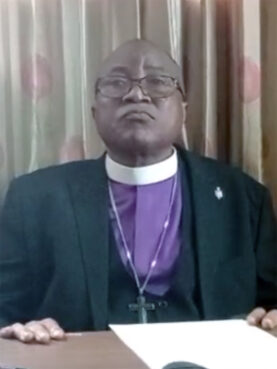The General Conference also passed measures to restructure the denomination, giving each region greater equity in tailoring church life to its own customs and traditions, including an amendment that awards equal standing to its worldwide regions, including Africa, Europe, the Philippines and the United States.
The conference’s measures followed years of dissent and debate on LGBTQ issues that have resulted in a painful schism that has split some 7,600 U.S.-based churches from the denomination — about 25% of all U.S. congregations.
Bishop Samuel Jerome Quire. (Video screen grab)
Quire said he had explained the General Conference’s decisions to church leaders at the time and urged the denomination’s membership in Liberia to remain calm. But many members want a special session to determine the Liberian area’s relationship with the global denomination.
According to a senior leader in the Monrovia District Conference of the Liberia Annual Conference who did not want to be named, church members are opposed to regionalization that would pave the way for acceptance of homosexuality.
“We do not accept regionalization. The new policy comes with a package that includes LGBTQ issues and same-sex marriages,” a leader of the Elias D. McGill United Methodist Church in Monrovia told RNS in a telephone interview. “How can he say the United Methodist Church in Liberia is not a gay church, while it maintains a relationship with a church that accepts this policy?
“We want him to call for the special session so we can decide for ourselves,” he added.
Quire has suspended Elias D. McGill’s pastor, the Rev. Elijah Dajue, for joining the calls for the session, but on Oct.7, the church wrote the presiding bishop, rejecting the suspension and the new pastor Quire sent to the church.
Dajue “has done nothing wrong except his persistent teaching and preaching of the true message of salvation to us which exposes the contradiction and deceptive nature of regionalization policy against biblical teaching, belief and practice,” said the leaders in the letter.
The bishop has not called a special session, he said, because it may lead to the dissolution of his conference, pointing to a special session held by the United Methodist Church in Ivory Coast in May, where the body voted to leave the United Methodist Church. Similar votes have occurred in Zambia and Nigeria, where the resident bishop resigned after calling the special session.
“I call for a special they leave the church?” he said. “I said, that is not the right thing to do. There are other forums where we will meet. We have begun talking and will continue to talk.”
Regarding churches that have threatened in writing to break away from the Liberian church, Quire said: “They have forgotten their identity. … No local church has the right to remove itself from the United Methodist Church. They have no authority.”
This article originally appeared here.


